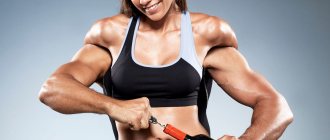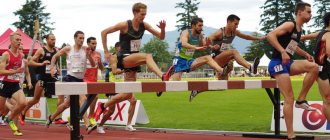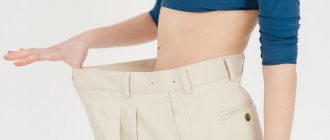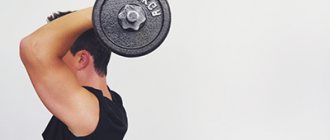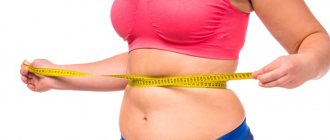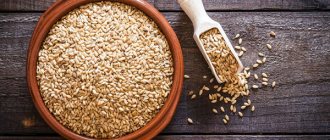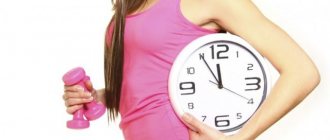Home>Articles> In what cases can you drink alcohol and play sports?
quick menu (hide)
- Is sport effective after binge drinking?
- How to combine sports and alcohol
- The myth about the compatibility of sports and alcohol
It’s such a custom in our country that after a hard day at work you need to relax with the help of alcohol. The promotion of alcoholic beverages in the media and their universal availability have led to the fact that this is perceived as a proper norm of existence. In addition, no entertainment event takes place without drinking. People are so used to alcohol that they can exercise after drinking alcohol. Next, let's try to figure out how compatible these two things are.
How alcohol affects the body
It doesn’t matter what exactly you drank - cognac, wine or cider - any alcohol will act on the body in the same way. “The main component of alcoholic beverages, which has various effects on the body, is ethyl alcohol or ethanol,” says Yesenia Kalyuzhina , a rehabilitation specialist at the SportMedica sports medicine clinic .
“It is a powerful psychotropic substance that affects the central nervous system and is actively involved in the body’s metabolic processes.” It is quickly absorbed into the blood and begins its “work”. “After entering the bloodstream, ethanol is most concentrated in the cells of the cerebral cortex (here it is 1.75 times more than in the blood) and liver (1.5 times more compared to the concentration in the bloodstream). After a short-term relaxation and state of euphoria, depression of the nervous system occurs, associated with a weakening and slowdown in the transmission of nerve impulses in synapses and neuron processes,” adds Yesenia Kalyuzhina.
That's why some people like to relieve stress with a couple of glasses of wine, forgetting, however, about the consequences of this method.
Alcohol metabolism
Ethyl alcohol quickly enters the bloodstream, passes through the liver and all vital organs. The process of alcohol absorption begins in the oral mucosa, so intoxication begins after a few minutes. At this time, the body begins to intensively cleanse itself of toxins. The liver does all the hard work. Through the kidneys, alcoholic drinks are filtered and eliminated from the body. Since athletes consume large amounts of nutrients, alcoholic beverages will negatively impact food absorption. Uric acid will accumulate in the kidneys and liver enzymes will increase dramatically.
Consequences of drinking alcohol
Alcohol puts a strain on many systems in our body. “Once ethanol enters the body, its metabolism becomes a priority for the entire system. Unlike carbohydrates, fats and proteins, ethanol does not have a “depot” where the body could “store” it, so it must be digested, notes Yesenia Kalyuzhina. “Under the influence of enzymes, ethanol is converted into acetaldehyde, which is essentially poison.” Wanting to get rid of it as quickly as possible, the body forces us to drink more water, urinate more often, etc.
But ethanol has the strongest effect on the nervous system, so training “under degrees” is unsafe. “Alcohol consumption changes our psychological state and behavior, namely, it distorts the perception of the real level of risk and makes us more aggressive. The relaxing effect of alcohol is reflected by impaired coordination and balance, and slower reactions. All this, of course, can lead to injuries,” says Yesenia Kalyuzhina.
Harm and influence of alcohol on training
If you are interested in the effectiveness of training - weight loss, improving endurance and strength - it is better to give up alcohol or reduce its consumption to a minimum.
Alcohol harms muscle growth . “Alcohol causes the release of the hormone cortisol, which has a catabolic (destructive) effect on muscle mass,” says Margarita Budassi, fitness testing specialist, nutritionist, therapist at the X-Fit fitness club in Russia . — Slowing muscle protein synthesis slows down the recovery process and reduces muscle strength. Alcohol also inhibits muscle growth by suppressing the secretion of insulin-like growth factor GF-I and growth hormone.”
Alcohol negatively affects glycogen stores in the liver , which impairs endurance, speed and strength.
Drinking alcohol reduces the concentration of nutrients in the blood. “Alcohol is a strong diuretic, it removes vitamins and minerals, the body spends resources on maintaining normal pH and recovery instead of building muscle mass and producing anabolic hormones,” adds Margarita Budassi.
Drinks that are too high interfere with recovery processes , since sleep deteriorates due to the release of cortisol.
As you can see, the consequences of drinking alcohol call into question the results of training “on all fronts”: stronger drinks harm both muscle growth and the development of endurance. They also put the health of the cardiovascular system at risk: alcohol causes dehydration and makes the blood more viscous. Thus, the heart is forced to work under load, pumping thicker blood.
Ideal abstinence time
Ideally, one hour between training and drinking is the absolute minimum. If you can, experts recommend waiting at least six hours. For individuals who practice serious strength training, the period of abstinence is doubled. So if you're heading to the gym in the afternoon, your evening should be alcohol-free.
Shoes chosen by women with good taste: trending models for 2022
Nagiyev is dissatisfied with the new role. How the actor tried on the role of Chikatilo
No sugar or lactose. Vegetarian milkshake
Can you drink alcohol before or after training?
Of course, no one can stop you from doing this. However, most experts do not advise combining strong drinks and fitness classes. Because this leads to:
Increased fatigue during classes. “Having drunk alcohol before training, you will get tired faster, since your body will first try to remove all the alcohol from the blood, and only then start producing glucose,” warns Yesenia Kalyuzhina.
To an increase in pain in the muscles . Alcohol negatively affects the functioning of the cardiovascular system, causing a lack of oxygen. “Long-term oxygen deficiency provokes increased lactate formation after exercise. Its increased concentration in the muscle can lead to the destruction of muscle fiber, whereas the goal of training is to strengthen the muscles. In addition, too high a lactic acid content can lead to muscle fatigue and cramps,” adds Yesenia Kalyuzhina.
Increases heart rate and overloads the cardiovascular system. “During sports, the heart already works at full capacity - alcohol increases heart rate, contributing to overload. This effect can last up to two days after drinking alcohol. Think about whether it’s worth overexerting your heart,” reminds Yesenia Kalyuzhina.
To worsening recovery . “When drinking alcohol in an amount that causes severe intoxication, restoration of muscle tissue and hormonal levels lasts from one to two weeks. And this is 2-6 workouts, depending on the sports regime,” says Margarita Budassi.
Desire to reward yourself
Let's look at the reasons why most people methodically attend workouts. Everyone wants to have a slim body, strong biceps and firm buttocks. However, fitness enthusiasts rarely do not associate sports with a lifestyle. They view their training as a mandatory duty that will lead them to their desired goal.
Non-professional athletes love to reward themselves. Ran an extra three kilometers? Then you can indulge in a piece of cake or a sweet alcoholic cocktail on the way home. Sometimes get-togethers at the bar with friends drag on until the morning. But are working out and whiskey and soda really compatible? And if drinking alcohol is not forbidden, then how long should you wait to pick up a glass of booze?
How does alcohol affect weight?
Bad news for those losing weight: alcohol interferes with weight loss. “Drinking alcohol, even in small quantities, slows down the body’s recovery process after exercise and increases cortisol levels. The stress hormone destroys our muscles and increases the accumulation of fat mass,” says Margarita Budassi.
But it's not just cortisol: alcohol stimulates appetite and reduces control, which leads to overeating. Finally, drinking alcohol provokes swelling, which can also add a couple of kilograms to you.
Motivation
Modern reality is simply mired in an abundance of harmful industrial waste, terrible ecology, people live in constant stress. Their bodies need proper rest, relaxation, and recuperation. This can be done in different ways. Why do some people find an outlet in alcoholic drinks and believe that such things can heal their soul and body, while others choose sports for themselves? After all, this is a more beneficial activity for their body. There is a third category of people who know how to combine incompatible alcohol and sports. Immediately after finishing a sports training, they relax with the help of alcoholic drinks.
Is it possible to combine alcohol and sports?
If you want to progress in your fitness routine, experts recommend cutting out alcohol altogether. Well, for some people it is simply prohibited to combine sports and alcohol. “Professional athletes, as well as people with diseases of the central nervous system, kidneys, liver and other digestive organs, should not combine alcohol and training,” says Yesenia Kalyuzhina.
If the result of fitness classes is not so important for you, you can drink alcohol in small quantities and only 4-6 hours after training. Never go to class while hungover.
What would you like to say to athletes who have a weakness for alcohol?
First of all, you should wish not to give up, continue to train and move towards sports success. If you suddenly encounter difficulties in your relationship with alcohol, you should contact our center. Here everyone can receive qualified help. At the same time, all information remains confidential, and the treatment process does not in any way affect the sports career.
If you are faced with the problem of alcoholism in your family, read our articles on how to force your husband to stop drinking and get treatment for an alcoholic.
How to reduce the harm of alcohol?
- Choose soft drinks. “The stronger and higher the calorie content of the alcohol, the more pronounced its detrimental effect on health and muscle tissue,” adds Margarita Budassi.
- Dose. “The health risk is minimal when drinking 100g of pure alcohol per week or 10g per day (equivalent to 32ml of strong alcohol (40%), 106ml of wine (12%), 244ml of beer (5%)). A dose of up to 20 g of pure alcohol per day is considered moderate. With it, the feeling of euphoria due to the stimulation of the synthesis of one’s own endorphins (pleasure hormones) is preserved, and the negative effect in the form of a hangover is minimal. However, much will depend on the individual characteristics of the body,” emphasizes Yesenia Kalyuzhina. In addition, some drinks require very little (up to 50 g) to get tangible pleasure. “The aura of whiskey is such that it can be enjoyed on different levels, appreciating the taste and aroma, and not just being satisfied with the primitive intoxication. After all, it is the most complex spirit in the world,” recommends Charles Maclean, Scottish whiskey guru and best-selling author of Wikipedia.
- Eat right. Experts recommend not drinking alcohol on an empty stomach, but you shouldn't overeat either. “When drinking alcohol, eat less fatty foods. Consume mostly protein and vegetables,” notes Margarita Budassi.
- Avoid drinks with sugar , including cocktails, liqueurs, etc. Dry wine is the safest for your figure.
- Drink more water. This will help you stay hydrated, reduce the risk of a hangover, and reduce swelling. And you will drink less alcohol this way.
Minimum abstinence time
Currently, science does not have a large number of studies that would be aimed at studying the effect of alcohol on the athlete’s body. However, most experts agree that drinking immediately after exercise will ruin all your efforts and even harm you. HIIT takes a lot of energy, increases the heart rate to abnormal levels and requires recovery.
Therefore, you need to delay drinking alcohol for at least an hour after finishing your workout. This is the period that is critical for recovery. He demands electrolyte drinks instead of beer and tequila. Together with sweat, not only water leaves your body, but also important macroelements: sodium and potassium. Orange juice without sugar, diluted with water, or mineral water without gases helps to replenish the electrolyte balance in the body.
